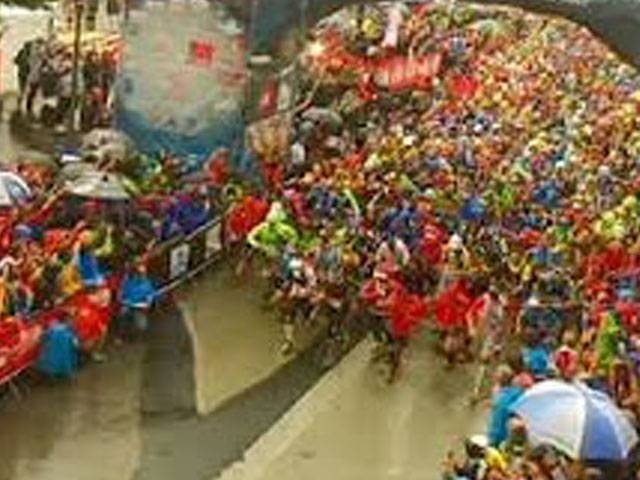MILAN - Hundreds of people protested against Italian Prime Minister Matteo Renzi’s plans to reform hiring-and-firing rules outside the congress centre where European leaders were due to meet on Wednesday for a conference on jobs.
The meeting in Milan coincides with a confidence vote in parliament to push through legislation that will enable the government to alter parts of the labour code including job protection measures that are fiercely defended by unions.
“Jobs have been eroded throughout Europe and we’re here to push for a new system that supports workers,” said Fabrizio Portaluri, a union delegate who works at tyre-maker Pirelli’s plant in Bollate near Milan. “The governments have to start to listen to what people are saying,” he said.
Some isolated scuffles broke out when masked protesters threw flares at police in riot gear but there were no reports of serious violence.
German Chancellor Angela Merkel and French President Francois Hollande were due in Milan along with leaders from other European Union countries for a meeting billed as a “high level conference” on jobs and growth. No concrete measures are expected from the meeting, which is due to last no more than three hours and which comes ahead of a full European Union summit at the end of the month.
But Renzi wants to use it as a platform to focus on the unemployment crisis in southern European countries like Italy, where the youth jobless rate has topped 44 per cent and where a generation of young people risk being shut out of the labour market. German Labour Minister Andrea Nahles said the meeting would discuss more effective use of funds earmarked to help young people into work. “It is important that the money that is available arrives as soon as possible,” she told reporters.
BUDGET DISPUTE
However the event may be overshadowed by a dispute over national budgets with France and Italy both in the firing line after putting back deficit and debt targets previously agreed with their European Union partners. Rome, which holds the rotating presidency of the EU, and Paris both argue that rigid application of budget rules will strangle the euro zone’s sickly economy, but they face opposition from Germany, which says countries must first push through effective structural reforms.
Renzi is desperate for a concrete sign that he is making progress with reform promises he made when he took office in February. His labour reform is intended to overhaul a system widely criticised for offering rigid guarantees to employees on full permanent contracts while leaving an increasing army of workers on short-term contracts with almost no protection.
At present, permanent employees of larger companies can sue to get their jobs back in cases of unfair dismissal. But the rules exclude those on short-term contracts, many of whom are younger people entering the workforce, and do not apply to the thousands of firms with fewer than 15 employees.
Renzi says the rigid labour law makes it unattractive for firms to take on new staff and deters foreign investment.
In the face of opposition from unions and sections of his own centre-left Democratic Party, Renzi wants to replace the system with a simpler set of rules that offer workers more protection as their seniority increases. But he has yet to spell out the details and the confidence vote, expected as the Milan meeting is due to conclude, will apply to broad-brush guidelines that will be filled out later. The confidence vote in the Senate, where the government has a slim majority, is aimed at truncating debate, and Renzi said he expected party rebels to swing behind him.
Friday, April 26, 2024
Protests greet EU leaders at jobs meeting in Italy

11 outlaws arrested in district raids
April 26, 2024
SSP holds meeting to enhance traffic flow
April 26, 2024
US vows to continue strengthening ties with Pakistan
9:54 AM | April 26, 2024
KPPSC chief calls on KP Governor, presents annual report
April 26, 2024
Swati vows to run KP assembly affairs indiscriminately
April 26, 2024
Economic Challenges
April 26, 2024
No Compromise
April 26, 2024
Strength and Solidarity
April 26, 2024
Musk vs Australia
April 25, 2024
Reforming Rehab
April 25, 2024
Photon power
April 26, 2024
Justice prevails
April 26, 2024
Ending animal suffering
April 25, 2024
AI governance
April 25, 2024
AI concerns
April 25, 2024
ePaper - Nawaiwaqt
Advertisement
Nawaiwaqt Group | Copyright © 2024





